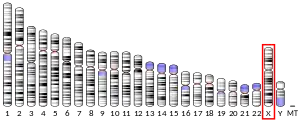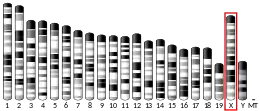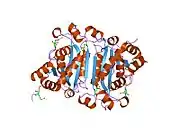| TREX2 | |||||||||||||||||||||||||||||||||||||||||||||||||||
|---|---|---|---|---|---|---|---|---|---|---|---|---|---|---|---|---|---|---|---|---|---|---|---|---|---|---|---|---|---|---|---|---|---|---|---|---|---|---|---|---|---|---|---|---|---|---|---|---|---|---|---|
 | |||||||||||||||||||||||||||||||||||||||||||||||||||
| |||||||||||||||||||||||||||||||||||||||||||||||||||
| Identifiers | |||||||||||||||||||||||||||||||||||||||||||||||||||
| Aliases | TREX2, three prime repair exonuclease 2 | ||||||||||||||||||||||||||||||||||||||||||||||||||
| External IDs | OMIM: 300370 MGI: 1346343 HomoloGene: 8046 GeneCards: TREX2 | ||||||||||||||||||||||||||||||||||||||||||||||||||
| |||||||||||||||||||||||||||||||||||||||||||||||||||
| |||||||||||||||||||||||||||||||||||||||||||||||||||
| |||||||||||||||||||||||||||||||||||||||||||||||||||
| |||||||||||||||||||||||||||||||||||||||||||||||||||
| |||||||||||||||||||||||||||||||||||||||||||||||||||
| Wikidata | |||||||||||||||||||||||||||||||||||||||||||||||||||
| |||||||||||||||||||||||||||||||||||||||||||||||||||
Three prime repair exonuclease 2 is an enzyme that in humans is encoded by the TREX2 gene.[5][6]
This gene encodes a protein with 3' exonuclease activity. Enzymes with this activity are involved in DNA replication, repair, and recombination. Similarity to an E. coli protein suggests that this enzyme may be a subunit of DNA polymerase III, which does not have intrinsic exonuclease activity.[6]
Mutations in this gene may lead to Aicardi-Goutieres syndrome
References
- 1 2 3 GRCh38: Ensembl release 89: ENSG00000183479 - Ensembl, May 2017
- 1 2 3 GRCm38: Ensembl release 89: ENSMUSG00000031372 - Ensembl, May 2017
- ↑ "Human PubMed Reference:". National Center for Biotechnology Information, U.S. National Library of Medicine.
- ↑ "Mouse PubMed Reference:". National Center for Biotechnology Information, U.S. National Library of Medicine.
- ↑ Mazur DJ, Perrino FW (Aug 1999). "Identification and expression of the TREX1 and TREX2 cDNA sequences encoding mammalian 3'-->5' exonucleases". J Biol Chem. 274 (28): 19655–60. doi:10.1074/jbc.274.28.19655. PMID 10391904.
- 1 2 "Entrez Gene: TREX2 three prime repair exonuclease 2".
Further reading
- Shevelev IV, Hübscher U (2002). "The 3' 5' exonucleases". Nat. Rev. Mol. Cell Biol. 3 (5): 364–76. doi:10.1038/nrm804. PMID 11988770. S2CID 31605786.
- Esposito T, Ciccodicola A, Flagiello L, et al. (1997). "Expressed STSs and transcription of human Xq28". Gene. 187 (2): 185–91. doi:10.1016/S0378-1119(96)00772-X. PMID 9099879.
- Hartley JL, Temple GF, Brasch MA (2001). "DNA cloning using in vitro site-specific recombination". Genome Res. 10 (11): 1788–95. doi:10.1101/gr.143000. PMC 310948. PMID 11076863.
- Li T, Duan W, Yang H, et al. (2001). "Identification of two proteins, S14 and UIP1, that interact with UCH37". FEBS Lett. 488 (3): 201–5. doi:10.1016/S0014-5793(00)02436-4. hdl:10536/DRO/DU:30009147. PMID 11163772. S2CID 40717095.
- Simpson JC, Wellenreuther R, Poustka A, et al. (2001). "Systematic subcellular localization of novel proteins identified by large-scale cDNA sequencing". EMBO Rep. 1 (3): 287–92. doi:10.1093/embo-reports/kvd058. PMC 1083732. PMID 11256614.
- Mazur DJ, Perrino FW (2001). "Structure and expression of the TREX1 and TREX2 3' --> 5' exonuclease genes". J. Biol. Chem. 276 (18): 14718–27. doi:10.1074/jbc.M010051200. PMID 11278605.
- Mazur DJ, Perrino FW (2001). "Excision of 3' termini by the Trex1 and TREX2 3'-->5' exonucleases. Characterization of the recombinant proteins". J. Biol. Chem. 276 (20): 17022–9. doi:10.1074/jbc.M100623200. PMID 11279105.
- Strausberg RL, Feingold EA, Grouse LH, et al. (2003). "Generation and initial analysis of more than 15,000 full-length human and mouse cDNA sequences". Proc. Natl. Acad. Sci. U.S.A. 99 (26): 16899–903. Bibcode:2002PNAS...9916899M. doi:10.1073/pnas.242603899. PMC 139241. PMID 12477932.
- Shevelev IV, Beliakova NV, Kravetskaia TP, Krutiakov VM (2003). "[The correcting role of autonomous 3'-->5' exonucleases in mammalian multienzyme DNA polymerase complexes]". Mol. Biol. (Mosk.). 36 (6): 1055–61. PMID 12500544.
- Shevelev IV, Ramadan K, Hübscher U (2004). "The TREX2 3'-->5' exonuclease physically interacts with DNA polymerase delta and increases its accuracy". ScientificWorldJournal. 2: 275–81. doi:10.1100/tsw.2002.99. PMC 6009725. PMID 12806015.
- Gerhard DS, Wagner L, Feingold EA, et al. (2004). "The status, quality, and expansion of the NIH full-length cDNA project: the Mammalian Gene Collection (MGC)". Genome Res. 14 (10B): 2121–7. doi:10.1101/gr.2596504. PMC 528928. PMID 15489334.
- Wiemann S, Arlt D, Huber W, et al. (2004). "From ORFeome to biology: a functional genomics pipeline". Genome Res. 14 (10B): 2136–44. doi:10.1101/gr.2576704. PMC 528930. PMID 15489336.
- Perrino FW, Krol A, Harvey S, et al. (2005). "Sequence variants in the 3'-->5' deoxyribonuclease TREX2: identification in a genetic screen and effects on catalysis by the recombinant proteins". Adv. Enzyme Regul. 44: 37–49. doi:10.1016/j.advenzreg.2003.11.010. PMID 15581481.
- Perrino FW, Harvey S, McMillin S, Hollis T (2005). "The human TREX2 3' -> 5'-exonuclease structure suggests a mechanism for efficient nonprocessive DNA catalysis". J. Biol. Chem. 280 (15): 15212–8. doi:10.1074/jbc.M500108200. PMID 15661738.
- Rual JF, Venkatesan K, Hao T, et al. (2005). "Towards a proteome-scale map of the human protein-protein interaction network". Nature. 437 (7062): 1173–8. Bibcode:2005Natur.437.1173R. doi:10.1038/nature04209. PMID 16189514. S2CID 4427026.
- Mehrle A, Rosenfelder H, Schupp I, et al. (2006). "The LIFEdb database in 2006". Nucleic Acids Res. 34 (Database issue): D415–8. doi:10.1093/nar/gkj139. PMC 1347501. PMID 16381901.
- Hahn Y, Lee B (2007). "Human-specific nonsense mutations identified by genome sequence comparisons". Hum. Genet. 119 (1–2): 169–78. doi:10.1007/s00439-005-0125-6. PMID 16395595. S2CID 21059468.
- Chen MJ, Ma SM, Dumitrache LC, Hasty P (2007). "Biochemical and cellular characteristics of the 3' -> 5' exonuclease TREX2". Nucleic Acids Res. 35 (8): 2682–94. doi:10.1093/nar/gkm151. PMC 1885668. PMID 17426129.
- Parra D, Manils J, Castellana B, Viña-Vilaseca A, Morán-Salvador E, Vázquez-Villoldo N, Tarancón G, Borràs M, Sancho S, Benito C, Ortega S, and Soler C (2009). "Increased Susceptibility to Skin Carcinogenesis in TREX2 Knockout Mice". Cancer Research. 69 (16): 6676–84. doi:10.1158/0008-5472.CAN-09-1208. PMID 19654293.
External links
This article is issued from Wikipedia. The text is licensed under Creative Commons - Attribution - Sharealike. Additional terms may apply for the media files.




